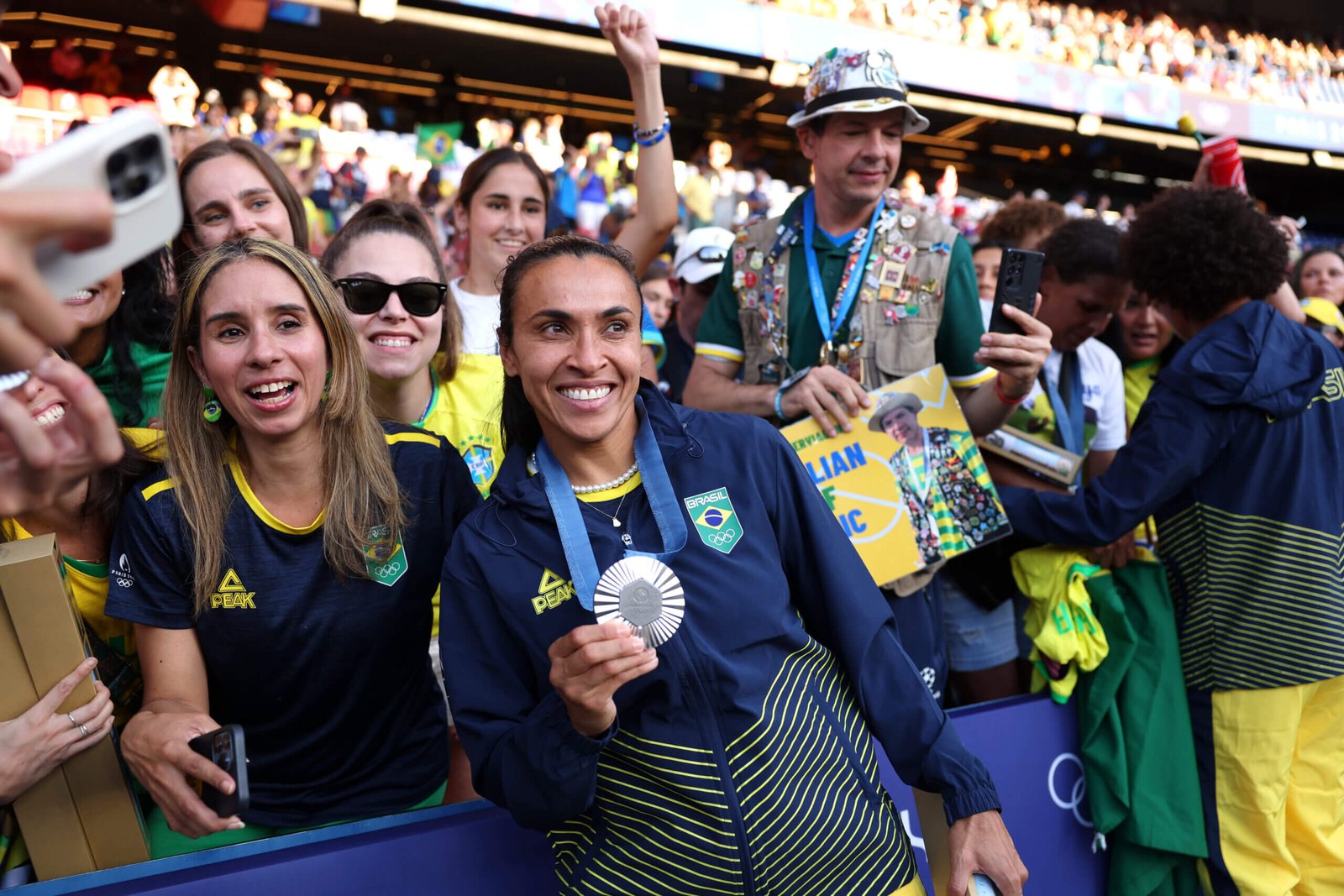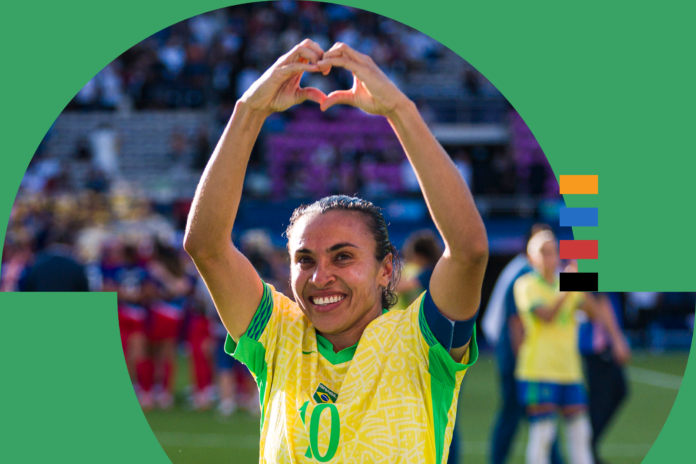There was no perfect ending for Marta, but that didn’t matter. The Brazilian legend was still proud.
In so many ways, a gold medal match was the perfect ending to Marta’s major tournament career with Brazil. Her first Olympics, 20 years ago, ended in a silver finish at the hands of the U.S. in 2004. The same happened in 2008. And this time, in 2024, it also ended that way — second place, watching the Americans step up onto the podium for their gold medals after the U.S. women’s national team beat Brazil 1-0 at Parc des Princes on Saturday.
Those were the facts, not the feelings. The feelings mattered more, in the end.
“When I won silver in 2004 and 2008, I didn’t feel as proud as I do at this moment,” Marta told reporters in the mixed zone after the match, answering a few questions solely in Portuguese. “I waited 16 years to play in another Olympic final. Let’s be honest, due to our recent tournament record, not many people were expecting Brazil to leave here with a medal.”
That Brazil made it to the final in Paris was perhaps a surprise, not just because of their group-stage exit at the 2023 World Cup. They snuck into the knockout rounds with a -2 goal differential as one of the third-place teams, eking past Australia with a -3 goal differential. And they were without Marta, their captain, after she received a red card in their final group stage match against Spain that resulted in a two-game ban for foul play.
(Marcio Machado/Eurasia Sport Images/Getty Images)
First, they toppled the host nation, France, in the quarterfinals. Then, the World Cup winners Spain in the semifinals. Up in the stands, Marta pumped her fists and danced in celebration. This was her chance to write her own ending at the close of her international career, a gift from her teammates.
So when she entered the match in the second half at the 61st minute, first there was a murmur as she stood, bib off, getting final instructions. Then, the first swell of sound as she waited at the sideline for her entrance, before finally the roar as she took the field and her name was announced as a substitute.

(Justin Setterfield/Getty Images)
There was no moment of magic though. In the 89th minute, her free kick sailed over the U.S. crossbar, Alyssa Naeher raising a hand more out of obligation than any real threat. In one of the last moments of the game, with Brazil trying to break into the box, Marta was whistled for a handball. Less than two minutes later, the final whistle had sounded.
Silver.
Again.
👑 Rainha Marta… A nossa Rainha! A palavra é gratidão. Você é a história!
Palavras não são capazes de descrever o tamanho da sua grandeza. A maior de todos os tempos. Inspiração para tantas gerações. Um legado que jamais será esquecido! Estaremos juntas! E sempre será assim… pic.twitter.com/V77MOEDMkw
— Seleção Feminina de Futebol (@SelecaoFeminina) August 10, 2024
For Marta, though, no matter what the result of Saturday’s game, there would be no doubt about her legacy. And she called silver “a rescue act” after the match.
“The rescuing of pride we feel when we see that Brazilian women’s football can compete, when we remember we have talent,” she said. “We need to value it more.”
There were a lot of people talking about the program when the team loses, she said. “They criticize, but they don’t help.” Marta wanted to reframe who this medal was for — the people who believed in them. Many of them were in the stands, easily confirmed by the many pockets of canary yellow and the sheer number of Brazilian flags on display at any given moment during the match.
“We don’t owe a thing to the opportunists who talk s***,” she concluded.
And why should they? Brazil will host the 2027 World Cup, hopefully a tournament that will once again redefine the interest and investment in the sport at home for a country that once legally banned women from playing football.
Marta will be there. She promised that on Saturday. It just won’t be on the pitch. She said she didn’t see herself playing in any more tournaments, following earlier comments that this would be her final year with the national team. But there’s no way she’ll miss 2027, it will just look different, “in the stadium, cheering on the girls.” She doesn’t know the future plans of the national team, but she still hopes to contribute in some form.
“This is my life,” she said. “I won’t walk away from football. I want to help this generation in some way.”
There will be an immense amount of pressure on the Selecao in three years when they host. That is the nature of a World Cup. But Marta believes in this generation of players, a group who all acknowledge the role she’s played in their lives as footballers.
And in the immediate near term, there will be the comfort of returning to Orlando and the project of winning an NWSL championship with the Pride. Undefeated through the entire first half of the season before the Olympic break, there are more trophies on the line that Marta’s never won — both the NWSL shield for the best regular season record and the NWSL championship. There won’t be any slowing down over the next few months.

(Robert Cianflone/Getty Images)
In the mixed zone at Parc des Princes, silver medal glinting from her neck, Marta was holding back tears once again. But it was pride that she kept coming back to, that feeling overwhelming everything else.
“I’ve been doing what I love the most for over 20 years. I think back and remember everything I had to do to get here; leaving my family at age 14,” she said.
“I dedicated my life to a sport that wasn’t always seen as a sport for women. Today, it’s one of the most followed sports, in the media and by the public. Someone had to start that process. I’m very proud to have contributed to that process in some way.”
(Top photo: Getty Images)
Read the full article here


